5 aug 2018
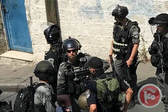
Six Jerusalemites were detained by Israeli forces, who escorted Israeli settlers to the Palestinian cemetery of Bab al-Rahma, to perform Jewish religious prayers on Sunday in occupied East Jerusalem.
The Wadi Hilweh Information Center said in statement that Israeli forces raided the Bab al-Rahma cemetery, wall-to-wall with the Al-Aqsa Mosque of its eastern side, and detained six Jerusalemites. video
The six detainees were identified as the director of Wadi Hilweh Information Center, Jawad Siyam, Khaled al-Zayer, Muhammad Odeh, Iyad Jaber, Asaad Kashaam, and Mutasem Khalayla.
The detainees were immediately taken in for interrogation.
The center added that following the interrogation, Jawad Siyam was released and explained that two female Israeli settlers raided the cemetery and began to perform religious prayers under the protection of Israeli forces.
Siyam added that while Israeli forces provided protection to Israeli settlers, who performed prayers among Palestinian graves, they had verbally assaulted the Jerusalemites before detaining them.
Siyam pointed out that two of the detainees, al-Zayer and Jaber, were kept at the police station in the Old City of Jerusalem for further investigation, while the other detainees were released immediately.
The center stressed that Israeli settlers raid the Bab al-Rahma cemetery daily to perform religious prayers among the graves. Recently, groups of Israeli settlers purposely broke several graves while performing prayers in the cemetery under the protection of Israeli forces.
In May, Israeli authorities placed metal fences around the parts of the cemetery that it intends on confiscating. Parts of the cemetery, which are subjected to confiscation and destruction, contain the centuries-old graves of Muslim leaders.
While Israel annexed East Jerusalem in 1980, according to Palestinians and the international community, the city has remained an intricate part of the occupied Palestinian territory and would be considered the capital of any future Palestinian state as part of a two-state solution.
The fate of Jerusalem and its holy sites has been a focal point of the Israeli-Palestinian conflict for decades, with numerous tensions arising over Israeli threats regarding the status of non-Jewish religious sites in the city, and the "Judaization" of East Jerusalem.
The Wadi Hilweh Information Center said in statement that Israeli forces raided the Bab al-Rahma cemetery, wall-to-wall with the Al-Aqsa Mosque of its eastern side, and detained six Jerusalemites. video
The six detainees were identified as the director of Wadi Hilweh Information Center, Jawad Siyam, Khaled al-Zayer, Muhammad Odeh, Iyad Jaber, Asaad Kashaam, and Mutasem Khalayla.
The detainees were immediately taken in for interrogation.
The center added that following the interrogation, Jawad Siyam was released and explained that two female Israeli settlers raided the cemetery and began to perform religious prayers under the protection of Israeli forces.
Siyam added that while Israeli forces provided protection to Israeli settlers, who performed prayers among Palestinian graves, they had verbally assaulted the Jerusalemites before detaining them.
Siyam pointed out that two of the detainees, al-Zayer and Jaber, were kept at the police station in the Old City of Jerusalem for further investigation, while the other detainees were released immediately.
The center stressed that Israeli settlers raid the Bab al-Rahma cemetery daily to perform religious prayers among the graves. Recently, groups of Israeli settlers purposely broke several graves while performing prayers in the cemetery under the protection of Israeli forces.
In May, Israeli authorities placed metal fences around the parts of the cemetery that it intends on confiscating. Parts of the cemetery, which are subjected to confiscation and destruction, contain the centuries-old graves of Muslim leaders.
While Israel annexed East Jerusalem in 1980, according to Palestinians and the international community, the city has remained an intricate part of the occupied Palestinian territory and would be considered the capital of any future Palestinian state as part of a two-state solution.
The fate of Jerusalem and its holy sites has been a focal point of the Israeli-Palestinian conflict for decades, with numerous tensions arising over Israeli threats regarding the status of non-Jewish religious sites in the city, and the "Judaization" of East Jerusalem.
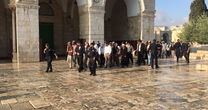
Dozens of Israeli settlers stormed on Sunday morning Jerusalem’s al-Aqsa Mosque—the third holiest site in Islam—via the Maghareba Gate.
36 Israeli settlers, escorted by policemen, broke into al-Aqsa Mosque as part of the morning break-in shift and carried out a round of sacrilegious tours.
Dozens more are expected to show up at the site in the next few hours. The Muslim authorities and worshipers expressed concern that the mosque would be turned into a military barrack by the Israeli police and settlers.
At the same time, the peaceful Muslim worshipers have been subjected to tough crackdowns and restrictions by the Israeli police near the main entrances to the site.
Several worshipers have been searched and dozens more have had their IDs seized while attempting to enter al-Aqsa to perform their daily prayers.
36 Israeli settlers, escorted by policemen, broke into al-Aqsa Mosque as part of the morning break-in shift and carried out a round of sacrilegious tours.
Dozens more are expected to show up at the site in the next few hours. The Muslim authorities and worshipers expressed concern that the mosque would be turned into a military barrack by the Israeli police and settlers.
At the same time, the peaceful Muslim worshipers have been subjected to tough crackdowns and restrictions by the Israeli police near the main entrances to the site.
Several worshipers have been searched and dozens more have had their IDs seized while attempting to enter al-Aqsa to perform their daily prayers.
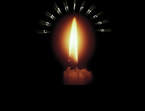
Mohammed Arshidat 85
An elderly Palestinian was killed late Saturday night after he was hit by an Israeli settler driving in the Ein Samia area, east of Ramallah.
According to Palestinian medical sources, the elderly citizen, called Mohammed Arshidat and aged 85, died after an Israeli settler rammed his car into his vulnerable body and fled right away.
Israeli ambulance crews who showed up at the scene pronounced him dead shortly afterwards.
The casualty’s son has been detained by the Israeli police for the second day over allegations of protesting attacks by Israeli settlers against Bedouin communities in the vicinity of Kafr Malik village east of Ramallah.
An elderly Palestinian was killed late Saturday night after he was hit by an Israeli settler driving in the Ein Samia area, east of Ramallah.
According to Palestinian medical sources, the elderly citizen, called Mohammed Arshidat and aged 85, died after an Israeli settler rammed his car into his vulnerable body and fled right away.
Israeli ambulance crews who showed up at the scene pronounced him dead shortly afterwards.
The casualty’s son has been detained by the Israeli police for the second day over allegations of protesting attacks by Israeli settlers against Bedouin communities in the vicinity of Kafr Malik village east of Ramallah.
4 aug 2018
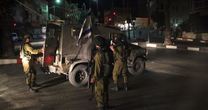
The Israeli occupation forces (IOF) last night and at dawn Saturday stormed the town of Asira al-Qibliya, south of Nablus in the West Bank, and took photos of several homes.
According to local sources, Israeli foot soldiers came from the illegal settlement of Yitzhar to their town at dawn and embarked on photographing homes, including the house of mayor Hafed Saleh.
The troops withdrew from the town after they toured its neighborhoods.
There is still no information about why the IOF took pictures of homes in the town.
During the past week, Asira al-Qibliya had been exposed to aggressive practices by soldiers and settlers, who set fire to cultivated plots of lands and attacked homes.
In a separate incident, a horde of armed Jewish settlers infiltrated into the eastern area of Bayt Dajan town aboard vehicles and toured the area for several hours before withdrawing to their settlement.
According to local sources, Israeli foot soldiers came from the illegal settlement of Yitzhar to their town at dawn and embarked on photographing homes, including the house of mayor Hafed Saleh.
The troops withdrew from the town after they toured its neighborhoods.
There is still no information about why the IOF took pictures of homes in the town.
During the past week, Asira al-Qibliya had been exposed to aggressive practices by soldiers and settlers, who set fire to cultivated plots of lands and attacked homes.
In a separate incident, a horde of armed Jewish settlers infiltrated into the eastern area of Bayt Dajan town aboard vehicles and toured the area for several hours before withdrawing to their settlement.
3 aug 2018
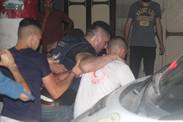
Violent confrontations erupted as hundreds of Israeli settlers stormed, on Wednesday night, the northern West Bank city of Nablus, guarded by the Israeli forces and for the purpose of performing Talmudic rituals.
Eyewitnesses reported that Israeli forces, accompanied by a bulldozer, stormed Beit Furik checkpoint, to the east of Nablus.
Dozens of Israeli soldiers then stormed the Dahiya neighborhood, near Joseph’s tomb, coming from the military point on Mount Gerizim.
Confrontations centered in Dahiya, Jerusalem Street, Amman Street and Al-Hesba Street, in the vicinity of the tomb, where Israeli soldiers fired sound bombs and tear gas.
During the confrontations, journalist Mu’tasim Suqef al-Hitt, a reporter for Quds News Network, was wounded with two metal bullets in his feet while covering the events. He received treatment on the ground, and was then transferred to hospital.
Eyewitnesses reported that Israeli forces, accompanied by a bulldozer, stormed Beit Furik checkpoint, to the east of Nablus.
Dozens of Israeli soldiers then stormed the Dahiya neighborhood, near Joseph’s tomb, coming from the military point on Mount Gerizim.
Confrontations centered in Dahiya, Jerusalem Street, Amman Street and Al-Hesba Street, in the vicinity of the tomb, where Israeli soldiers fired sound bombs and tear gas.
During the confrontations, journalist Mu’tasim Suqef al-Hitt, a reporter for Quds News Network, was wounded with two metal bullets in his feet while covering the events. He received treatment on the ground, and was then transferred to hospital.
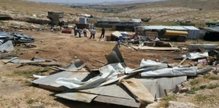
Israeli settlers vandalized nearly a dozen Palestinian vehicles on Thursday, in the Ein Yabrud village, east of the central occupied West Bank district of Ramallah.
Locals told Ma’an NEws Agency that Israeli forces stormed the village escorting a number of Israeli settlers who vandalized several Palestinian-owned vehicles and spray painted racist slogans on them.
The incident comes a few days following a similar attack in the village of al-Mughayyir, northeast of the Ramallah district, during which Israeli settlers vandalized Palestinian property by slashing tires of eight Palestinian vehicles and spraying racist, anti-Palestinian graffiti on the walls of Palestinian homes.
According to a report from Israeli NGO B’Tselem, in April 2018 alone, 14 Israeli settler assaults were documented across the occupied West Bank.
Palestinian activists and international rights groups have accused Israel of fostering a “culture of impunity” for Israelis committing violent acts against Palestinians.
Better known as “price tag” attacks, extremist Israeli settlers use violent acts of retribution on Palestinians and their property, to demonstrate their opposition to Israeli restrictions on settlements and their outposts in the occupied West Bank.
Locals told Ma’an NEws Agency that Israeli forces stormed the village escorting a number of Israeli settlers who vandalized several Palestinian-owned vehicles and spray painted racist slogans on them.
The incident comes a few days following a similar attack in the village of al-Mughayyir, northeast of the Ramallah district, during which Israeli settlers vandalized Palestinian property by slashing tires of eight Palestinian vehicles and spraying racist, anti-Palestinian graffiti on the walls of Palestinian homes.
According to a report from Israeli NGO B’Tselem, in April 2018 alone, 14 Israeli settler assaults were documented across the occupied West Bank.
Palestinian activists and international rights groups have accused Israel of fostering a “culture of impunity” for Israelis committing violent acts against Palestinians.
Better known as “price tag” attacks, extremist Israeli settlers use violent acts of retribution on Palestinians and their property, to demonstrate their opposition to Israeli restrictions on settlements and their outposts in the occupied West Bank.
2 aug 2018
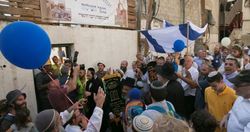
The Israeli occupation authority (IOA) on Wednesday opened a Jewish heritage center in a building in the overwhelmingly Palestinian district of Silwan near the Aqsa Mosque, east Jerusalem.
In cooperation with pro-settler groups, the site was inaugurated under the name of the "Jewish Yemenite heritage center" in the presence of Israeli ministers and former US governor Mike Huckabee. The center is part of Israel’s systematic steps to Judaize the town of Silwan, south of the Aqsa Mosque.
The IOA claims that the building of the center was used as a synagogue in the 19th century by Yemeni Jews and that they demanded a Palestinian family to evacuate it since 2004.
However, those Yemeni Jews had lived in Silwan district as refugees for a period no longer than 50 years after they were welcomed by Palestinian residents at the time, according to Palestinian anti-settler groups.
The building was acquired in 2015 by the right-wing Ateret Cohanim organization (Jewish group), which settles Jews in east Jerusalem, following a long legal battle that culminated with an Israeli court ordering the Palestinian Abu Nab family living there to leave.
One member of the family still has an apartment in the building, and Ateret Cohanim is trying to extract a court order to evacuate the Palestinian resident by force.
In this regard, Hanna Issa, head of the Islamic Christian Authority for Patronizing Jerusalem and Holy sites, said that the opening of this Jewish center “falls within the framework of Israel’s ongoing settlement crimes in the West Bank and Jerusalem.”
He described Israel’s settlement activities in the occupied Palestinian territories as “illegal and war crimes under international law.”
In cooperation with pro-settler groups, the site was inaugurated under the name of the "Jewish Yemenite heritage center" in the presence of Israeli ministers and former US governor Mike Huckabee. The center is part of Israel’s systematic steps to Judaize the town of Silwan, south of the Aqsa Mosque.
The IOA claims that the building of the center was used as a synagogue in the 19th century by Yemeni Jews and that they demanded a Palestinian family to evacuate it since 2004.
However, those Yemeni Jews had lived in Silwan district as refugees for a period no longer than 50 years after they were welcomed by Palestinian residents at the time, according to Palestinian anti-settler groups.
The building was acquired in 2015 by the right-wing Ateret Cohanim organization (Jewish group), which settles Jews in east Jerusalem, following a long legal battle that culminated with an Israeli court ordering the Palestinian Abu Nab family living there to leave.
One member of the family still has an apartment in the building, and Ateret Cohanim is trying to extract a court order to evacuate the Palestinian resident by force.
In this regard, Hanna Issa, head of the Islamic Christian Authority for Patronizing Jerusalem and Holy sites, said that the opening of this Jewish center “falls within the framework of Israel’s ongoing settlement crimes in the West Bank and Jerusalem.”
He described Israel’s settlement activities in the occupied Palestinian territories as “illegal and war crimes under international law.”
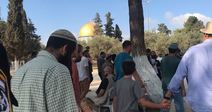
Dozens of Israeli settlers stormed on Thursday morning Jerusalem’s al-Aqsa Mosque—the third holiest site in Islam—via the Maghareba Gate.
Hordes of Israeli settlers, escorted by policemen, broke into al-Aqsa Mosque as part of the morning break-in shift and carried out a round of sacrilegious tours.
At the same time, the peaceful Muslim worshipers have been subjected to tough crackdowns and restrictions by the Israeli police near the main entrances to the site.
Several worshipers have been searched and dozens more have had their IDs seized while attempting to enter al-Aqsa to perform their daily prayers.
Hordes of Israeli settlers, escorted by policemen, broke into al-Aqsa Mosque as part of the morning break-in shift and carried out a round of sacrilegious tours.
At the same time, the peaceful Muslim worshipers have been subjected to tough crackdowns and restrictions by the Israeli police near the main entrances to the site.
Several worshipers have been searched and dozens more have had their IDs seized while attempting to enter al-Aqsa to perform their daily prayers.
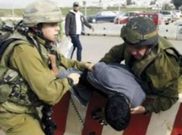
Dozens of Israeli soldiers invaded, on Thursday at dawn, Nablus city in northern West Bank, while accompanying dozens of colonialist settlers into the city, shot two Palestinians and caused many others to suffer the effects of teargas inhalation.
The soldiers also assaulted and injured a young man near Bethlehem.
Media sources in Nablus said the soldiers accompanied several buses loaded with Israeli colonialist settlers into “Joseph’s Tomb” area, leading to confrontations with local protesters.
The soldiers fired many live rounds, rubber-coated steel bullets and gas bombs at random, wounding Mo’tasem Hamdi Saqf al-Heit, 30, with rubber-coated steel bullets in the right thigh and left leg.
The soldiers also hurled a gas bomb into a car, driven by Amir Na’el Dweikat, 22, wounding him in several parts of his body.
Both Palestinians received the needed treatment by local medics before being rushed to Rafidia governmental hospital.
Many Palestinians suffered the effects of teargas inhalation, and received the needed treatment without the need to be moved to a hospital.
The Palestinians believe that Joseph’s Tomb is the funerary monument to Sheikh Yusef Dweikat, a local religious and social figure. Others believe that the tomb belongs to the Biblical patriarch Joseph, revered by Jews, Samaritans, Christians and Muslims alike, but the site remains off-limits to the Palestinians.
In addition, the soldiers assaulted a Palestinian at the “Container” military roadblock, east of Bethlehem, before he was moved to a Palestinian hospital.
Eyewitnesses said the soldiers assaulted and injured the young man, identified as Malek Ishaq Masa’fa, 23, causing various cuts and bruises.
In Jenin, in northern West Bank, the soldiers invaded the home of a political prisoner from Ya’bad town, southwest of the city, identified as Adnan Hamarsha, and violently searched the property while interrogating his family.
The soldiers caused property damage to Hamarsha’s home, before confiscating his car and a mobile phone.
The soldiers also assaulted and injured a young man near Bethlehem.
Media sources in Nablus said the soldiers accompanied several buses loaded with Israeli colonialist settlers into “Joseph’s Tomb” area, leading to confrontations with local protesters.
The soldiers fired many live rounds, rubber-coated steel bullets and gas bombs at random, wounding Mo’tasem Hamdi Saqf al-Heit, 30, with rubber-coated steel bullets in the right thigh and left leg.
The soldiers also hurled a gas bomb into a car, driven by Amir Na’el Dweikat, 22, wounding him in several parts of his body.
Both Palestinians received the needed treatment by local medics before being rushed to Rafidia governmental hospital.
Many Palestinians suffered the effects of teargas inhalation, and received the needed treatment without the need to be moved to a hospital.
The Palestinians believe that Joseph’s Tomb is the funerary monument to Sheikh Yusef Dweikat, a local religious and social figure. Others believe that the tomb belongs to the Biblical patriarch Joseph, revered by Jews, Samaritans, Christians and Muslims alike, but the site remains off-limits to the Palestinians.
In addition, the soldiers assaulted a Palestinian at the “Container” military roadblock, east of Bethlehem, before he was moved to a Palestinian hospital.
Eyewitnesses said the soldiers assaulted and injured the young man, identified as Malek Ishaq Masa’fa, 23, causing various cuts and bruises.
In Jenin, in northern West Bank, the soldiers invaded the home of a political prisoner from Ya’bad town, southwest of the city, identified as Adnan Hamarsha, and violently searched the property while interrogating his family.
The soldiers caused property damage to Hamarsha’s home, before confiscating his car and a mobile phone.
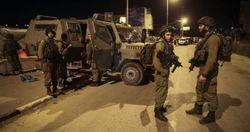
The Israeli occupation forces on Wednesday night stormed the eastern area of Nablus city in large numbers and secured the entry of hundreds of Jewish settlers for rituals.
According to local sources, scores of Israeli soldiers were deployed at the Huwara checkpoint south of Nablus and others swarmed the eastern area of Nablus before a huge number of settlers aboard buses entered the area and performed rituals at Joseph’ Tomb.
The settlers’ visit to the tomb came after extremist Jewish groups incited their followers on social media to march en masse to the shrine and attend the inauguration of the renewed tomb, which was renovated recently.
Jewish settlers and soldiers enter the eastern area of Nablus almost every week at the pretext of performing rituals at the shrine, but their unwelcome presence in the city and the unbearable noises they create during their alleged prayers there usually provoke clashes with local young men.
Jewish settlers and groups claim that Joseph’s Tomb belongs to a biblical figure, but the fact is that it is the grave of a Palestinian religious figure called Sheikh Yousef Duweikat.
According to local sources, scores of Israeli soldiers were deployed at the Huwara checkpoint south of Nablus and others swarmed the eastern area of Nablus before a huge number of settlers aboard buses entered the area and performed rituals at Joseph’ Tomb.
The settlers’ visit to the tomb came after extremist Jewish groups incited their followers on social media to march en masse to the shrine and attend the inauguration of the renewed tomb, which was renovated recently.
Jewish settlers and soldiers enter the eastern area of Nablus almost every week at the pretext of performing rituals at the shrine, but their unwelcome presence in the city and the unbearable noises they create during their alleged prayers there usually provoke clashes with local young men.
Jewish settlers and groups claim that Joseph’s Tomb belongs to a biblical figure, but the fact is that it is the grave of a Palestinian religious figure called Sheikh Yousef Duweikat.
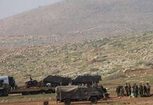
Hebrew media sources have revealed that the attacks carried out by Israeli settlers on Palestinian villages in the West Bank have been escalated recently.
Haaretz newspaper on Wednesday said that settler attacks have become a routine, adding that almost every week, Palestinian citizens in different village wake up to find that their property has been vandalized with racist slogans written on them.
Haaretz said that the Israeli police sometimes arrest some settlers for being involved in hate crimes against Palestinians, but they are released shortly after.
The Hebrew newspaper pointed out that the Palestinian citizens of al-Mughayyir village near Ramallah woke up Monday morning to discover that they had "unwelcome visitors" overnight.
Scores of Israeli settlers punctured the tires of a number of Palestinian vehicles, spray-painted racist slogans on the houses' walls, and destroyed about 25 trees.
Haaretz said, quoting B'Tselem organization, that around 2,000 Palestinian-owned trees have been cut down by Israeli settlers in two months.
Groups of Israeli settlers on a regular basis launch attacks on Palestinian property in the 1948 occupied Palestinian territories, West Bank and East Jerusalem under the name "Price Tag".
These attacks may escalate to murder attempts, vandalism, and arson attacks, especially on Islamic and Christian sites and cemeteries.
Haaretz newspaper on Wednesday said that settler attacks have become a routine, adding that almost every week, Palestinian citizens in different village wake up to find that their property has been vandalized with racist slogans written on them.
Haaretz said that the Israeli police sometimes arrest some settlers for being involved in hate crimes against Palestinians, but they are released shortly after.
The Hebrew newspaper pointed out that the Palestinian citizens of al-Mughayyir village near Ramallah woke up Monday morning to discover that they had "unwelcome visitors" overnight.
Scores of Israeli settlers punctured the tires of a number of Palestinian vehicles, spray-painted racist slogans on the houses' walls, and destroyed about 25 trees.
Haaretz said, quoting B'Tselem organization, that around 2,000 Palestinian-owned trees have been cut down by Israeli settlers in two months.
Groups of Israeli settlers on a regular basis launch attacks on Palestinian property in the 1948 occupied Palestinian territories, West Bank and East Jerusalem under the name "Price Tag".
These attacks may escalate to murder attempts, vandalism, and arson attacks, especially on Islamic and Christian sites and cemeteries.
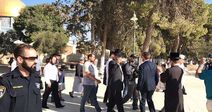
Jerusalem's Islamic Awqaf (endowment) department on Wednesday said in a statement that 3,809 Israeli settlers broke into al-Aqsa Mosque in July under the protection of Israeli police.
The Islamic Awqaf affirmed that this number is the largest recorded in just one month, saying that it indicates an increase in the Israeli violations targeting al-Aqsa Mosque.
Last Friday, on the first anniversary of al-Aqsa Mosque protests against the metal detectors installed at its gates, the Israeli police broke into the Mosque following Friday prayer and fired sound bombs at Palestinian worshipers injuring dozens of them.
The Israeli police further arrested 24 Palestinians after severely beating them. All of the detainees, except five youths whose detention was extended, were banned from visiting al-Aqsa Mosque for several weeks.
During the same month, three Jerusalemite women were banned from entering al-Aqsa Mosque for two weeks. Al-Aqsa guards were also arrested and interrogated several times in July.
The Israeli police allow settlers to visit al-Aqsa Mosque twice a day: in the morning and the afternoon. Fridays and Saturdays are the only days with no scheduled settler break-ins.
The Islamic Awqaf affirmed that this number is the largest recorded in just one month, saying that it indicates an increase in the Israeli violations targeting al-Aqsa Mosque.
Last Friday, on the first anniversary of al-Aqsa Mosque protests against the metal detectors installed at its gates, the Israeli police broke into the Mosque following Friday prayer and fired sound bombs at Palestinian worshipers injuring dozens of them.
The Israeli police further arrested 24 Palestinians after severely beating them. All of the detainees, except five youths whose detention was extended, were banned from visiting al-Aqsa Mosque for several weeks.
During the same month, three Jerusalemite women were banned from entering al-Aqsa Mosque for two weeks. Al-Aqsa guards were also arrested and interrogated several times in July.
The Israeli police allow settlers to visit al-Aqsa Mosque twice a day: in the morning and the afternoon. Fridays and Saturdays are the only days with no scheduled settler break-ins.
